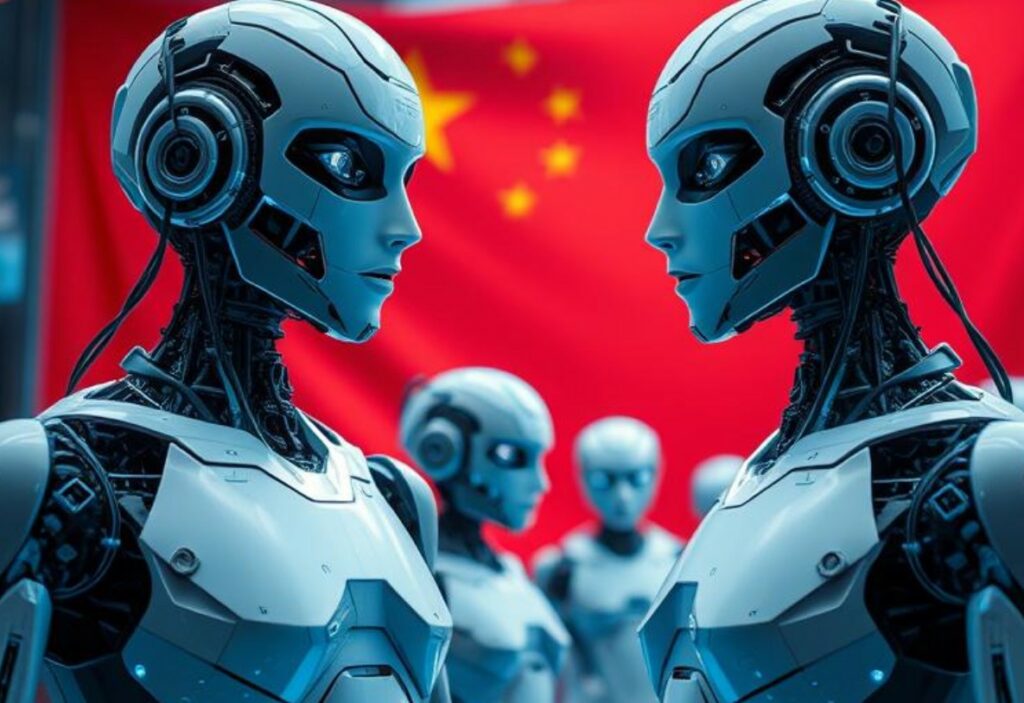
In August 2025 , China’s State Council released the “Opinions on Deepening the Implementation of the ‘Artificial Intelligence Plus’ Action Plan” , aiming to accelerate the construction of a new intelligent economy and a society based on human-machine collaboration, cross-sector integration, and shared co-creation.
The ” Artificial Intelligence+ ” program, promoted nationwide, represents one of the central guidelines of China’s technological development. It is no longer an abstract concept: AI is now integrated into everyday life, transforming key areas such as healthcare , finance , and education , and establishing itself as a truly “intelligent partner” for improving the population’s well-being and quality of life.
During the World Intelligent Industry Expo 2025 , held in Chongqing on September 6, 2025 , a domestic robot shook hands with visitors, symbolizing the evolution of Chinese civilian robotics.
A few months earlier, on July 17, 2025 , at the China International Supply Chain Promotion Expo in Beijing , an employee with a right-hand disability from Zhejiang Qiangnao Technology Co., Ltd. presented the BrainCo intelligent bionic hand , a concrete example of the integration of AI and personal assistance.
In the medical and healthcare field, China is experiencing a profound digital transformation.
According to Ni Yuan , General Manager of Ping An Technology ‘s Medical AI Product Team , artificial intelligence is revolutionizing workflows in Chinese hospitals: “In the past, patients were passive in the treatment journey, but today AI enables proactive and personalized care.” By analyzing real-time clinical data, doctors can work in multidisciplinary teams and provide more accurate diagnoses, more timely treatments, and an overall higher quality of care.
On September 15, 2025 , at Changsha Zhigu , Xiangjiang New District, Hunan Province, visitors were able to use an ultrasound diagnostic robot to perform neck scans, demonstrating how AI is becoming entrenched in primary care medicine.
At the same time, China’s financial sector is also at the center of the “AI+” transformation.
Zhou Wei , General Manager of the Transaction and Asset Risk Management Department of the Credit Card Center at China Merchants Bank , explained that AI has become a “digital guardian” of citizens’ savings. New AI-based customer service systems can recognize users’ intentions, provide accurate responses, and ensure continuous protection of funds , 24/7. Looking ahead, credit institutions in China will move toward “intelligent partnership” models, offering increasingly personalized and secure services.
According to Wang Zikai , chief engineer at the Shanghai Institute of Artificial Intelligence , the “AI+” approach is ushering in a new technological era: generalization capabilities, interactive interfaces and integrated development environments are bringing about a historic transformation.
On October 14, 2025 , at the Yiwu Global Digital Trade Center , two foreign traders experienced an interactive AI-based real-time translation panel , demonstrating how China is also focusing on the internationalization of its AI technologies.
Thanks to government policies, industry support, and technological research, China is accelerating the transition of artificial intelligence from a simple operational tool to a strategic partner . The new human-machine synergy and cross-sector integration promise to build a safer , healthier , and more connected society.
The Chinese education system is also undergoing profound change.
On October 23, 2025 , at the China Computer Conference 2025 , Liu Zhiyuan , Associate Professor of Computer Science at Tsinghua University , presented his research on the role of artificial intelligence in learning. According to Liu, AI is redefining the relationship between teaching and learning, paving the way for personalized and borderless education models .
The professor emphasized that traditional Chinese education faces the dilemma of scale versus personalization: large classrooms ensure systematic knowledge transmission, but risk losing the individual approach.
To overcome this limitation, Liu introduced teaching innovations in the “Fundamentals of Object-Oriented Programming” and “Writing and Communication” courses, combining structure and creativity to improve student engagement.
His team also developed the intelligent platform “MAIC” , where AI-powered teachers, assistants, and virtual students collaborate in an interactive educational environment, bringing to life the concept of “teaching AI with AI”.
At the same time, Tsinghua University launched the intelligent assistant “Qing Xiaoda,” which integrates thousands of academic resources on campus and accompanies students throughout their university career. Through the Intelligent Platform and Innovation Competition , faculty and students work together to develop new intelligent entities capable of meeting diverse educational needs, building an increasingly advanced academic ecosystem.
According to Liu Zhiyuan, the deep integration of AI and education in China offers enormous opportunities for transformation: artificial intelligence not only improves the quality of talent development, but also helps consolidate a future-oriented education system , strengthening China’s national strategy of growth through knowledge.
Follow us on Google News to receive daily updates on cybersecurity. Contact us if you would like to report news, insights or content for publication.
